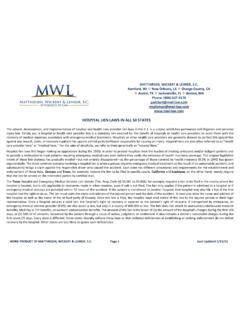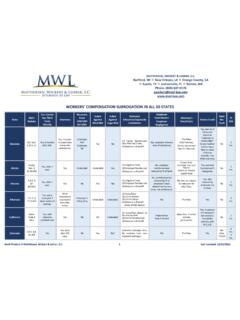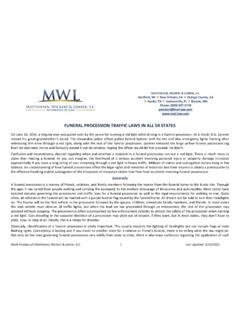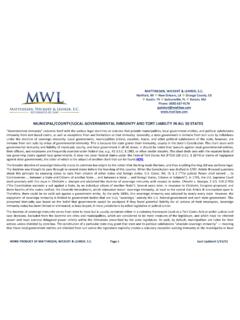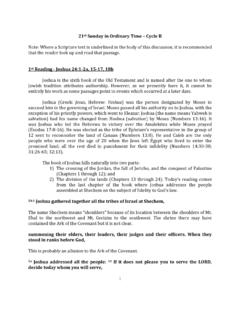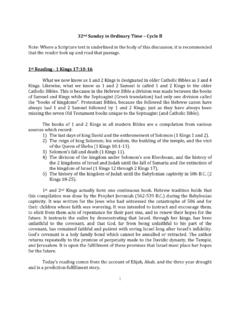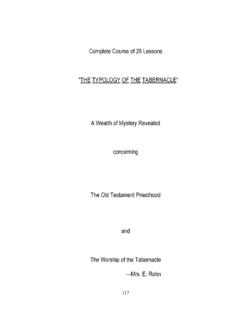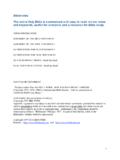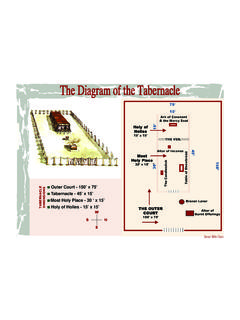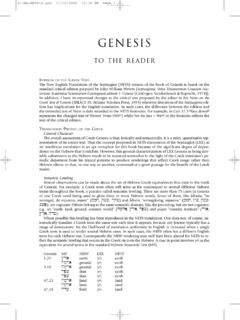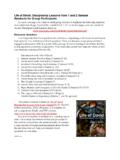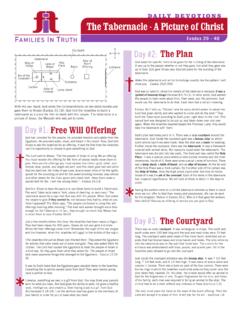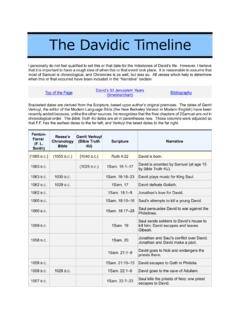Transcription of PRE-SUIT DISCLOSURE OF LIABILITY POLICY LIMITS CHART ...
1 WORK PRODUCT OF MATTHIESEN, WICKERT & LEHRER, Page 1 Last Updated 1/12/22 MATTHIESEN, WICKERT & LEHRER, Hartford, WI New Orleans, LA Orange County, CA Austin, TX Jacksonville, FL Boston, MA Phone: (800) 637-9176 PRE-SUIT DISCLOSURE OF LIABILITY POLICY LIMITS IN THIRD-PARTY CLAIMS Whether or not a third-party LIABILITY insurer has a duty to reveal its LIABILITY POLICY LIMITS to a third-party claimant even before a lawsuit is filed is a highly controversial and widely misunderstood issue in the field of insurance law. One approach supported by the trial lawyers presupposes that knowledge of the defendant s insurance POLICY LIMITS will facilitate settlement and avoid needless litigation which may expose the defendant to additional exposure unnecessarily. The opposing view espoused by defense lawyers and many within the insurance industry maintains that knowledge of the LIMITS of a LIABILITY carrier s insurance POLICY is irrelevant, immaterial and not germane to the ultimate LIABILITY issues of the claim.
2 With more and more states beginning to weigh in on the issue, whether or not a plaintiff s attorney (or a subrogated insurance company) can compel a tortfeasor/defendant s LIABILITY carrier to disclose the LIMITS of their applicable LIABILITY POLICY has become necessary information in many PRE-SUIT claims. This issue is separate and apart from the issue of whether a plaintiff is able to employ the tools of discovery available under the rules of civil procedure of the state and federal courts after suit is filed, (1) at a deposition hearing, (2) by written interrogatories or (3) by order of court to produce the LIABILITY POLICY for examination at a pre-trial conference. The following CHART concerns itself only with the duty to reveal LIABILITY POLICY LIMITS in third-party cases in which suit has not yet been filed. Information is power and it is well understood why a LIABILITY carrier might resist divulging this information.
3 It is an axiom of claim physics that a demand will expand to fit the applicable POLICY LIMITS . On the other hand, a failure to divulge the POLICY LIMITS could lead to a verdict in excess of POLICY LIMITS , potentially exposing the defendant to LIABILITY beyond POLICY LIMITS . As the argument goes, revealing the LIABILITY LIMITS could have avoided this LIABILITY beyond the applicable LIMITS of available insurance. In many states, an insurer s failure to reveal POLICY LIMITS at the pre-litigation stage can serve as a basis for third-party bad faith claims. Furthermore, because a failure to disclose POLICY LIMITS could be instrumental in resolving a conflict of interest favoring the insurance company s economic interests over those of its policyholders, a LIABILITY carrier that refuses to reveal LIMITS could be exposing itself to bad faith claims from its own insureds.
4 The duty to reveal POLICY LIMITS encompasses two separate legal issues: (1) whether there is a statute, regulation, or case decision which compels a LIABILITY carrier to reveal POLICY LIMITS when requested to do so; and (2) whether a failure to reveal POLICY LIMITS when asked can serve as the basis for a subsequent bad faith case should there be a verdict in excess of POLICY LIMITS . In some cases, a statute literally prohibits the revelation of POLICY LIMITS at the PRE-SUIT stage. For example, in California, the terms of an insurance POLICY are confidential and proprietary between the insurer and insured. Griffith v. State Farm Mut. Auto Ins. Co., 230 59 165 (1991) (information about POLICY LIMITS is personal information between the insurer and insured under the California Insurance Information and Privacy Protection Act). Whether or not to reveal an insurer s LIABILITY POLICY LIMITS is a sensitive issue because it lays bare a point within the claims process where the interests of the insurer (favors the insurer not to reveal POLICY LIMITS ) diverge with those of the insured (revelation aids settlement and may prevent litigation).
5 A demand for POLICY LIMITS is routinely alleged to be necessary in order to properly evaluate and settle a case. If the settlement demand is within POLICY LIMITS , the demand is rejected, and the WORK PRODUCT OF MATTHIESEN, WICKERT & LEHRER, Page 2 Last Updated 1/12/22 insured experiences a judgment in excess of POLICY LIMITS for which the insurance company refuses to indemnify it, a bad faith claim is not far behind. In third-party claims, information regarding the amount of money available to compensate the third-party claimant is often guarded as a highly classified matter of national security. But they could do so at their own peril. In some states, such as Florida, the lack of a formal offer to settle does not preclude a finding of bad faith. Powell v. Prudential Property & Cas. Ins. Co., 584 12 (Fla. App. 1991). Although an offer of settlement was once considered a necessary element of a duty to settle in Florida (31 Insurance 818, at 295 (1981)), it has grown to be only one factor to be considered in a bad faith claim.
6 Bad faith LIABILITY may be predicated on a refusal to disclose POLICY LIMITS . 14 Couch on Insurance 2d 51:11, at 398 (Rev. ed. 1982). The argument is that refusal to inform a claimant of the POLICY LIMITS deprives the claimant of a basis for evaluating the case, thus hindering settlement. Cernocky v. Indemnity Ins. Co., 69 196, 216 198 (1966). Therefore, in Illinois, a refusal to disclose POLICY LIMITS may constitute a basis for a bad faith claim. For more information regarding the duty of an insurer to reveal POLICY LIMITS , contact Gary Wickert at STATE DUTY TO DISCLOSE FAILURE TO DISCLOSE A BASIS FOR BAD FAITH COMMENTS ALABAMA No. Alabama law recognizes bad faith actions and actions based on negligence when the insurer wrongfully fails to settle a claim against its insured. Waters v. Am. Cas. Co. of Reading, Pa., 73 So. 2d 524, 529-30 (Ala. 1954). Thus, if an insurance carrier is given the opportunity to settle within POLICY LIMITS , Alabama law imposes a duty of ordinary care on the insurer to investigate the matter and see if the settlement is feasible.
7 Id. Alabama courts have held that the decision not to settle must be honest, intelligent, and objective. State Farm Mut. Auto. Ins. Co. v. Hollis, 554 387, 390 (Ala. 1989). Alabama law does not require DISCLOSURE of LIMITS of coverage prior to the filing of a civil action. Ala. R. Civ. P. 26(b)(3). However, Alabama law does allow discovery of the contents of any insurance agreement by which an insurer may be liable to satisfy part or all of a judgment that may be entered in the action or to indemnify or reimburse for payments made to satisfy the judgment. LIMITS of LIABILITY insurance policies are discoverable in personal injury actions under rule permitting discovery of the existence and contents of LIABILITY POLICY LIMITS . Ex parte Badham, 730 135 ( ). ALASKA No. Alaska recognizes a common law bad faith cause of action.
8 Alaska courts have held that there is a fiduciary duty inherent in every insurance contract which gives rise to an implied covenant of good faith and fair dealing. Lumber Co. Inc. v. Providence Wash. Ins. Co., 759 523 (Alaska 1988). Thus, an insurer has an obligation to investigate claims and to inform the insured of all settlement offers and the possibility of excess recovery by the injured claimant. Id. However, mere negligence in denying coverage is not enough to support a tort claim for bad faith. Alaska Pac. Assur. Co. v. Collins, 794 936 (Alaska 1990). WORK PRODUCT OF MATTHIESEN, WICKERT & LEHRER, Page 3 Last Updated 1/12/22 STATE DUTY TO DISCLOSE FAILURE TO DISCLOSE A BASIS FOR BAD FAITH COMMENTS ARIZONA No. In Arizona, some courts have held that the insured may have an affirmative duty to initiate and effectuate settlement in cases where LIABILITY is clear, and the injuries are so serious that a judgment in excess of the POLICY LIMITS is likely.
9 The Arizona Supreme Court held that an insured must give its insured s interests equal consideration as its own in a third-party bad faith analysis. Clearwater v. State Farm Mut. Auto. Ins. Co., 792 719, 722 (Ariz. 1990). The factors to consider are the strength of the injured claimant s case against the insured; failure to properly investigate the evidence against the insured; failure to inform the insured of a compromise offer; and the amount of financial risk borne by each party for failure to settle. Prior the filing of a lawsuit, insurers do not have to reveal POLICY LIMITS . There is no statute in Arizona that mandates this. Once a lawsuit is filed then the information regarding the amount of insurance coverage available is discoverable. ARKANSAS No. In Arkansas, courts have held an insurer liable to its insured for any excess judgment of the insured s POLICY LIMITS if the failure to settle the claim by the insurer is due to fraud, bad faith, or negligence.
10 See McCall v. Southern Farm Bureau Casualty Ins. Co., 255 Ark. 401, 501 223 (1973); see also Members Mut. Ins. Co. v. Blissett, 254 Ark. 211, 492 429 (1973) (Arkansas Supreme Court found insurer negligent for failing to settle within POLICY LIMITS in). CALIFORNIA No. When requested, carrier risks bad faith if it doesn t disclose LIMITS in high value cases and/or doesn t ask its insured for permission to reveal the LIMITS . Carrier has interest in not disclosing LIMITS , but this can adversely affect the possibility that an excess claim against a policyholder might be settled within POLICY LIMITS . Aguilar v. Gostischef, 220 475 (2013); Reid v. Mercury Ins. Co., 220 262 (2013) (absence of any pre-litigation settlement demand); Boicourt v. Amex Assurance Co., 78 1390 (2000). California s requirement of obtaining an insured s written consent before disclosing POLICY LIMITS is found in California Insurance Code (a).




